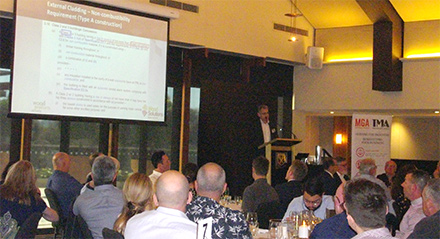
Last week Timber Merchants Australia in conjunction with MGA Independent Retailers held an industry lunch in Melbourne for its joint membership along with industry stakeholders, suppliers to timber and parliamentary guests. Speakers at the lunch were Eileen Newbury (FWPA), Brien McDonald (NAB) and Boris Iskra (WPV). Source: Timberbiz
At the event held at the Kooyong Lawn Tennis Club there was ample opportunity for networking and learning with each speaker offering a unique view to the timber industry.
Ms Newbury spoke at length about the new FWPA campaign The Ultimate Renewable branding which is for industry and consumers and was launched on TV in July this year after 18 months of research into media reports, in industry meetings and with focus groups.
“Forestry is a quite a complex system, it’s got multiple stakeholders with contradictory messages,” she said.
“People see forests as an important environmental and recreational resource but not an economic resource. They have an emotional connection with forests and half feel that forests are threatened.”
Ms Newbury said that while in general people are keen to use wood they are not keen to cut down trees hence the program has focussed on the fact that trees are a renewable resource.
The FWPA is wanting the entire industry, the entire supply chain to use the branding from harvesting to haulage to timber merchants in order to reinforce the message.
Mr McDonald, the chief economist at NAB, spoke to the changing and slowing economy and how that affects the timber industry specifically with analysis on building and construction in Australia.
Finally, Mr Iskra talked about the issues facing the use of timber products externally on buildings and where the industry currently stands.
“We heard that the regulators were talking about banning the use of timber cladding to the outside of these low rise buildings,” he said. “So, discussions were held but unfortunately the regulators continued down the pathway.”
An advisory note was sent out which said that although the practice had been approved for the past 20 years it was no longer approved, though there are some exceptions. This note applied to low rise apartment buildings, not houses.
Industry replied to the amendments asking for the cladding to be permitted. The regulators have yet to decide on the outcomes but if it goes ahead as is timber cladding on three storey apartment buildings without a sprinkler system will not be allowed.
Submissions on this amendment closed in early October 2019, Mr Iskra said that major timber suppliers as well as Forests and Wood Products Australia were among those who had made submissions to allow the cladding to be used.
Mr Iskra said there is also concern that in general, house builders are being scared off from the use of cladding in residential houses and may also turn their attention to timber not only for cladding but for building in general.
“The industry needs to be aware of what it can and can’t do so that it can correctly advise its clients or consumers,” Mr Iskra said.





